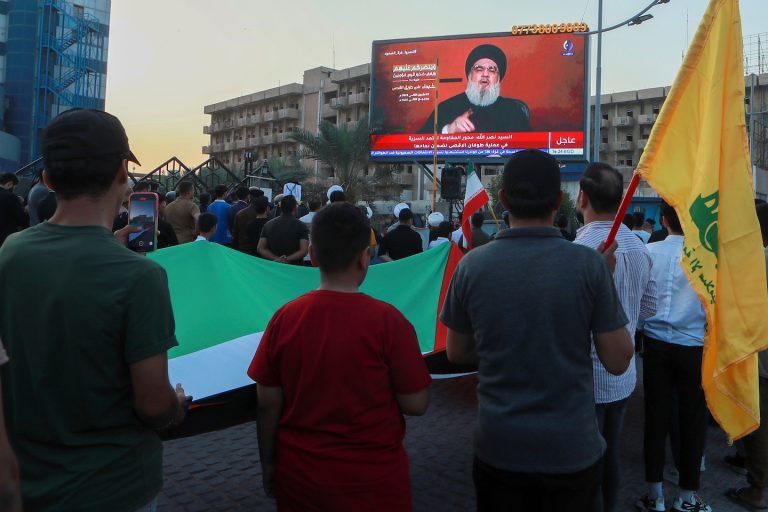Nasrallah had previously warned that “any assassination on Lebanese soil targeting a Lebanese, Palestinian, Syrian, Iranian, or others will certainly have a strong reaction.”
Retaliation by Hezbollah could risk a broader regional conflict, which Israel, Iran and other countries have so far avoided.
Here's what to know about Nasrallah's role in Hezbollah and his views on the war between Israel and Gaza.
Nasrallah was born in Beirut in 1960. He studied to become a cleric in Shiite institutes in Iran and Iraq.
He reportedly joined Hezbollah in the early 1980s, after the 1982 Israeli invasion of Lebanon. He became the group's leader in 1992 after his predecessor, Mr. Abbas al-Musawi, was assassinated by Israeli forces.
Nasrallah, 63, led Hezbollah in the latter half of the Israeli occupation of Lebanon, which officially lasted for 15 years at the end of the 20th century.
Although not technically a public official in Lebanon, Nasrallah is one of the country's most looming political figures. Hezbollah and its allies lost the majority in the parliamentary elections that took place last year, but it still retains the largest share of seats, at a time of economic crisis and widespread discontent.
Nasrallah is known for his long, resonant speeches and his pronounced lisp. His followers call him “Al-Sayyid” or “Abu Hadi” – after Hadi’s father, his son who was killed in clashes with Israeli forces in 1997.
One of his most triumphant moments was during the month-long war waged by Hezbollah fighters and Israel in 2006: three days into the conflict, speaking live with Hezbollah's Al-Manar channel, he said the surprises he had promised were about to begin. . An Israeli warship was targeted at the time.
“Watch it burn,” he said.
Walid Fares, a Lebanese-born political commentator, told the Council on Foreign Relations in 2010 that some in Lebanon viewed Nasrallah as a “messianic figure.”
In a 2006 letter from Lebanon, Robin Wright, then a Washington Post reporter who visited Nasrallah in Beirut, wrote that Nasrallah's face was displayed there on computer screens, posters and key chains. Wright reported that “taxis played his speeches instead of music.”
Hezbollah's main goal, according to its 1985 manifesto, is the destruction of Israel. Under Nasrallah, Hezbollah continued to engage in skirmishes with Israel.
Although Hamas is Sunni and Hezbollah is Shiite, and although the two armed groups disagreed over other conflicts in the region, they recently found a common cause in opposing Israel. The destruction of Israel is also a declared goal of Hamas. The United States classifies both groups as terrorist organizations. Experts and officials say that both receive support from Iran.
It appears that the Israeli occupation of Lebanon shaped Nasrallah's motivations. He told Wright in 2006 that he and his peers witnessed “what happened in Palestine, in the West Bank, in the Gaza Strip, in the Golan, in Sinai.”
He said that this taught him that in Lebanon, “we cannot rely on the Arab League countries nor the United Nations.” “The only way forward is to take up arms and fight the occupation forces.”
What did Nasrallah say about the war between Israel and Gaza?
Since the conflict began on October 7, when Hamas attacked Israel, Hezbollah and Israel have exchanged fire near the Israeli-Lebanese border. However, the extent of Hezbollah's involvement in the war between Hamas and Israel remains unclear, amid fears of a broader regional escalation.
Nasrallah made his first public statements on the issue in a speech on Friday, saying that Hezbollah and other Hamas allies were not aware of the plans for the October 7 attack, but that Hamas had “no other choice” but to attack Israel. “The other option was silence and death,” he said.
In his speech, Nasrallah bragged that Hezbollah's “daily targeted” strikes against Israel were distracting and weakening it in its war against Hamas. He warned Israel against any “aggression or pre-emptive strike” on Lebanon, which he said would be “the greatest foolishness in the history of your existence.”
He said that Hezbollah's fight with Israel on the border is a “front of solidarity and support for Gaza.”
He said that this front is evolving based on developments in Gaza, adding that “all options are on the table and we can turn to them at any time.”
Sarah Daadoush, Elaine Francis, Justin McDaniel, Mohamed Al-Shamaa, and Frances Final contributed to this report.

